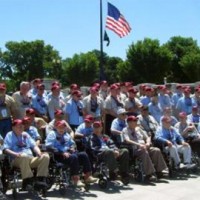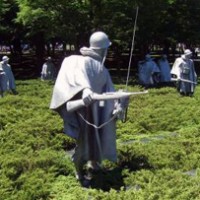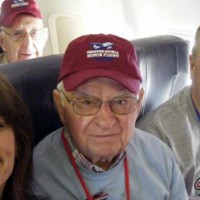Watson: Honor Flight's Memorable Trip (Part 2)
- Details
- Published on Monday, 10 June 2013 09:14
- Written by Doc Watson
Over the years when I've promoted a military event on radio or TV, I've debated whether to call the former soldiers veterans or heroes. I've decided that, even if they didn't serve during a time of war, the term heroes is justified. When they volunteer today, they don't know what the future holds. No one knows when or where our military will be called upon. Many of the veterans we easily describe as "heroes" – guys who fought courageously on the front lines and witnessed death all around them - did not volunteer for service. Uncle Sam plucked them when their "number was up." So while the Selective Service System sunsetted 30 years ago, most of the vets on the inaugural Greater Peoria Honor Flight to Washington, D.C., were drafted.
For the World War II, Korean War and Vietnam vets, who made up almost our entire first group, they not only did not know when they'd be chosen, but also what service branch, what role and what location they would be assigned. They may have chosen what military branch to serve in, but after that, their destination was random. It boggles my mind that they had so little control of this crucial chapter of their lives, so little control of their fate.
My seat mate on the blue bus in Washington was Korean War vet Gerald Hill, originally from Princeville, now residing in Snyder Village in Metamora. Hill wanted to enlist in the Navy, but was put on a waiting list and told to check the draft board. After learning that his birth date was second on that list, he returned to the Navy office in Chicago. Realizing that Hill was soon to be a member of the Army, the Navy recruiter told Hill, "Well, you're now number one on our list."
Little did he know when he shipped out toward Korea in January of 1953 that the war would be over in a half year. Hill avoided the major blood and guts of Korea, unlike his older brother, Mark, who saw fierce fighting in his Army unit and earned The Bronze Star. Hill returned to operate a service station in his hometown before transitioning to a police dispatcher.
On our flight to and from Washington, I shared row 18 with Navy vet Raymond Huette and his guardian Ginger Herman, both Morton residents. Herman is Morton's Mayor Pro Tem and had flown on an Honor Flight with her dad before out of Springfield. This time, she accompanied Huette, a longtime friend of Herman's father, dating back to their early school years in the early '30's in Allentown, IL.
After graduating from Morton High School at the age of 18, the Chicago draft board assigned Huette to the Navy that fall, though he has asked to join the Air Force with a buddy. Huette had no aspirations to become a doctor or even be in the medical field, but he soon found himself at Farragut Naval Training Center in Idaho, enrolled in a fast-tracked three month medical school, "three months with Grey's Anatomy," a book that has a current TV show named after it. He travelled aboard dirty, steam-powered "troop trains" to continue his training, making stops in Chicago, Maryland, Florida and Houston before shipping out in California and sailing into the heart of the Pacific fighting.
Huette served as a hospital apprentice in WWII aboard the USS Broadwater (APA 139) in the Philippines. On his first operation he assisted with the removal of a cyst on a sailor's tailbone. Huette said it was one of the bloodiest surgeries he would witness, and he "fed the fishes" afterward, getting sick from the sight of blood spurting about in the operating room.
The Broadwater transported troops to the beaches of Okinawa and helped land the first U.S. troops to occupy mainland Japan in August of 1945. It also survived a Japanese submarine attack, which sunk a cargo ship in the convoy, and was struck by 90-foot waves during a typhoon. Quite an eventful two and a half years for the young Huette, who would go on to work for over 37 years with the Morton State Bank.
I've often wondered why most soldiers of that era didn't talk about their experiences upon returning home. Herman suggested it may be "survivor's guilt." I asked Huette about soldier's reluctance to speak about what they'd seen in war. He replied, "When you see things like bodies floating next to your ship, it's not to be advertised."
Fundraising for the second Peoria Honor Flight is underway now. Tonight at 7 p.m. you can view the moving documentary, "Honor Flight: One Last Mission" at Morton's Bertha Frank Performing Arts Center. If you know someone who wants to be a guardian ($500) or a vet that might want to go on a future flight, get an application online at: http://www.greaterpeoriahonorflight.org/#!upcoming-events/c1pa9



















































